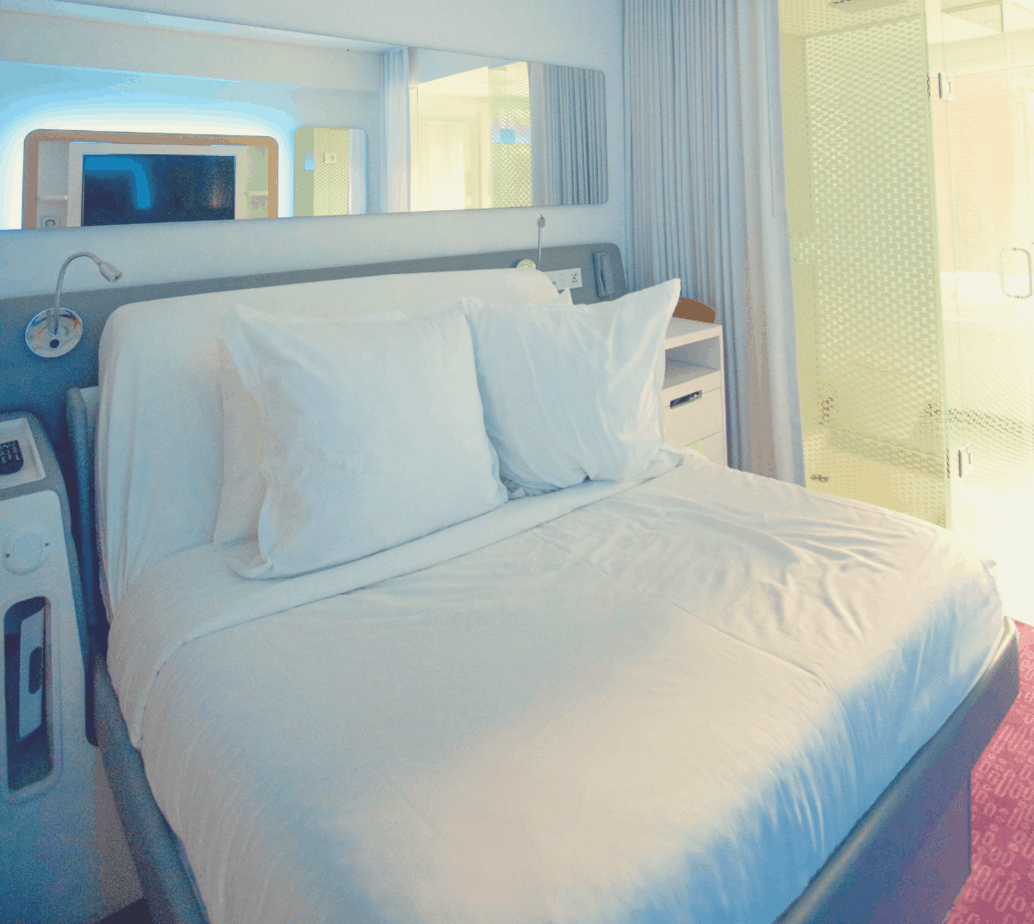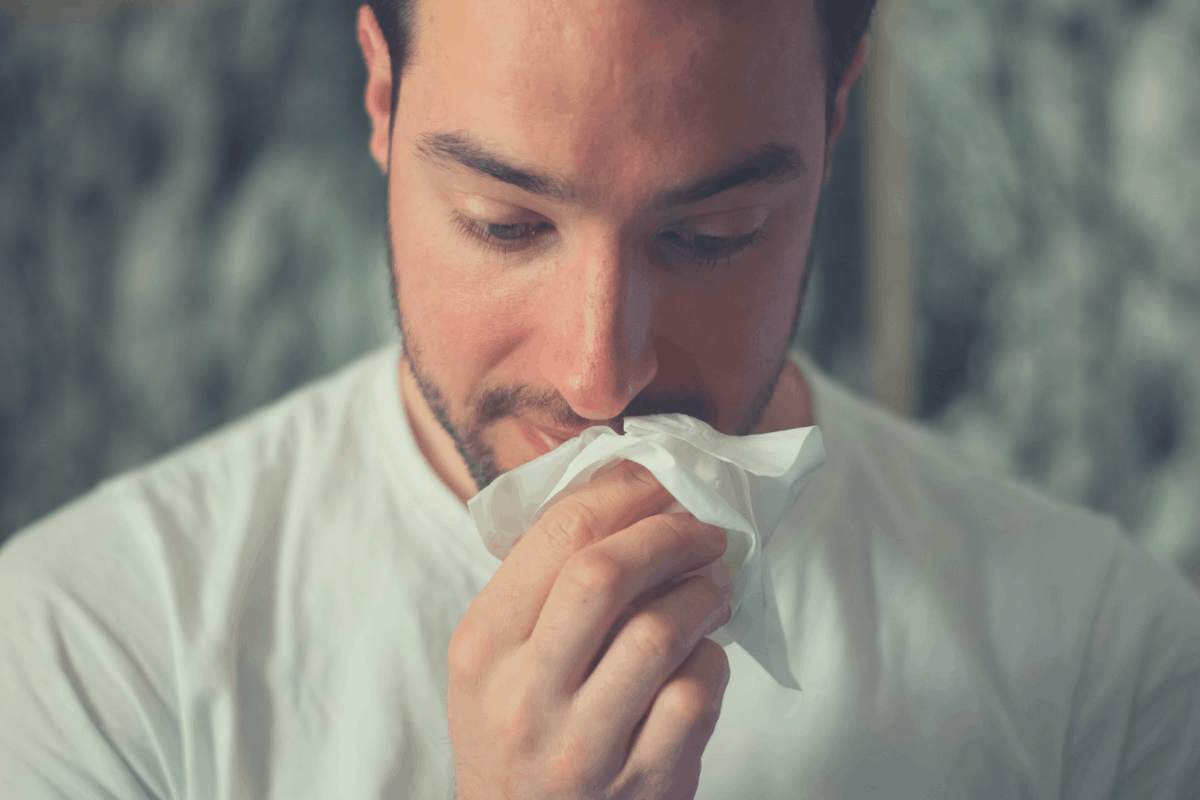Suffering from post-nasal drip can disrupt sleep and cause discomfort, but there are steps that can be taken to relieve symptoms and promote a good night’s rest.
This article covers ways to improve sleep through hydration, food and drinks, lifestyle changes, medications, and the best sleeping positions.
We also cover what post-nasal drip is and its causes. From chicken soup to avoiding fatty and fried foods, find the solution that works best for you.
How to Sleep with Post Nasal drip?
To sleep with a post nasal drip, you need to choose the right sleeping position and keep your bedroom clean and dust-free. You also need to rely on HEPA air filters and air conditioning. These are the most basic solutions to keep post nasal drip at bay and have a good night’s rest. Read on to learn more about post nasal drip.
Post Nasal drip, even in its mildest form, can interfere with sleep. If you’re reading this right now, it’s likely that you’ve tossed and turned in bed for hours because you’ve had signs of post nasal drip.
Let’s explore some of the proven techniques to alleviate symptoms and promote a good night’s sleep, no matter how awful you may feel.
Remember that the steps that can be taken to promote a good night’s sleep can be divided into 3 groups:
- Foods and drinks that relieve symptoms
- Lifestyle changes that can provide relief
- Medications for post nasal drip
- The best sleeping positions
Foods and drinks that can improve your sleep for post nasal drips
Here are a few foods and drinks we recommend if you’re serious about getting some much-needed sleep while stuck with a post nasal drip.
1. Stay Hydrated
Hydration is a simple solution that can improve sleep while you’re struggling with post nasal drip. Since these drips are caused by thickened mucus in the back of your throat, drinking plenty of water and other fluids should help thin it out.
By the time you go to bed, the symptoms should have subsided significantly, which can have a positive effect on sleep quality.
Many studies recommend drinking 8 glasses of water a day, but drinking more can be a good thing if you have post nasal drip symptoms.
However, try to reduce the amount of water you drink around bedtime to prevent waking up several times during the night with the urge to pee.
2. Chicken Soup

Another effective step to relieve symptoms is to drink something hot, such as chicken soup. This can help loosen the accumulated mucus in your throat and nose, while giving you the freedom to fall asleep and sleep through the night.
Chicken soup can contain spices that combine with the healing powers of chicken egg whites to help you heal faster. This is why it is one of the most popular home remedies for colds, sinusitis and other related infections.
However, in the absence of chicken soup, drinking something like hot tea can also loosen the tough mucus that forms in your throat and nose. This should help the ability to sleep and wake up feeling fresh.
3. Ditch the Alcohol
Your evening bedtime routine may include a glass of wine or scotch. However, this can worsen post nasal drip symptoms and cause significant sleep disturbances.
Sure, it may be easier said than done, but keep in mind that alcohol doesn’t mix well with the tough mucus that forms in the back of your throat.
You’re also more likely to drink cold alcohol, which can further aggravate symptoms.
Alcohol can also cause dehydration by increasing the urge to pee at regular intervals. This can defeat the purpose of trying to thin the mucus in your throat and nose.
4. Kick Fatty and Fried Foods to the Curb
One of the main causes of post nasal drip is GERD, which is common in people who eat a lot of fatty and fried foods. If you are currently suffering from a bout of post nasal drip, keeping fatty foods in check may be a smart move.
Instead, switch to healthy, lean meats, fruits, and vegetables to relieve symptoms and improve your ability to enjoy a comfortable night’s sleep.
Also, avoid coffee or caffeinated drinks like soda and make sure you eat your last meal at least 2-3 hours before bedtime.
5. Avoid Milk
Have you tried avoiding milk while your body is producing rampant amounts of mucus? If so, you may have noticed that symptoms seem to subside much more quickly.
There are several stories of people who experience a reduction in the amount of mucus their body produces when they stop consuming not only milk, but other dairy products, from yogurt to cheese.
Although there is no scientific evidence to support this theory yet, there are a significant number of people with similar stories.
What Is Post-Nasal Drip?
Post-nasal drips are abnormal sensations in the throat that make you feel like mucus is moving. These drips can cause coughing and other uncomfortable reactions, such as mucus dripping from your nose.
Chronic cold sufferers and those diagnosed with sinus infections typically experience post nasal drips on a regular basis. Other symptoms include the need to clear the throat more frequently due to excess mucus, a runny or stuffy nose, and bad breath.
Remember that the throat and nose routinely produce significant amounts of mucus that is swallowed unnoticed. If the mucus is so thick that you can feel it moving around, it could be a sign of a post nasal drip or other sinus problems.
Lifestyle choices that can promote sleep during a post nasal drip
A healthy diet can be a great way to achieve a happy night’s sleep, but there are also a number of lifestyle choices that can complement your diet. A few of these include:
1. Keeping Your Bedroom Clean
Sleeping in a dirty bedroom is not only gross, but it can be awful for anyone, especially if you are suffering from an episode of post nasal drip. The symptoms can be even worse for those who are prone to allergies, asthma, and other related health issues.
Such environments can be prone to dust mite invasion, leading to rapid reproduction not only on mattresses and sheets but also on pillows. This can lead to airway obstruction and further thickening of mucus in the back of the throat.
It is recommended to thoroughly clean the bedroom at least once a week, but if you are too busy to keep this schedule, then it is advisable to get mattress protectors. Also, change pillow covers every 3 to 4 days to improve the quality of the air you breathe, especially during the night.
If you are currently suffering from post-nasal drip, taking some time to clean your bedroom can have a positive effect on your sleep.
The SafeRest Hypoallergenic Premium Waterproof Mattress protector and the Set of 2 SureGuard Pillow Protectors are the best combination for my sleep. They provide protection from dust mites and allergens of all kinds. With thousands of 5-star reviews on Amazon, you can’t go wrong.
2. Air Filters and Purifiers
Did you know that Air Purifiers and filters can change the quality of the air in your bedroom?
First, air purifiers improve breathing by trapping airborne allergens in the atmosphere of your bedroom. The purified air is then released into the bedroom, which can be a great way to loosen the mucus in your throat.
Whether you are buying vacuum cleaners, air conditioners, or air purifiers, it is important that you choose units that are HEPA certified.
HEPA is an acronym for HighEfficiency Particulate Air, an efficiency standard for filtered air. To meet the HEPA standard, filters must achieve a certain level of efficiency, which is 99.95%-99.7% of potentially harmful particles from the air that passes through them.
The result is a cleaner air environment that promotes sleep and relieves post-nasal drip symptoms.
For those who suffer from post nasal drip like me, air purifiers should always be a part of your life. After trying a few duds, the Germ Guardian True HEPA Filter Air Purifier was an absolute beast for my sleep. It filters dust, mold, allergens, and smoke from my bedroom air, preventing post nasal drip and allergies since it arrived in my bedroom.
3. Hot Showers and Essential Oils

Few things work as well against the symptoms of post nasal drip as a hot shower before bed. Steam has always had positive effects on thinning mucus and the mechanism works well if you want to enjoy a blissful night.
Inhaling steam during a bath can thin the mucus in your throat and nose. In severe cases, filling the bathtub with hot water and inhaling directly into your nose and throat can be a quick way to get relief.
Bathing with essential oils also opens the skin pores and provides deeper relaxation. This can do wonders for your sleep, regardless of how severe your post nasal drip symptoms feel.
Peppermint, lavender, and eucalyptus are some essential oils that can help you fall asleep despite post nasal drip.
The Cliganic Essential Oils Set from Amazon contains 100 percent pure natural oils including USDA certified peppermint, Lemon Grass, lavender, eucalyptus, frankincense and orange. It has been a true revelation for soothing relief from post-nasal drip.
4. Get a Humidifier
I was never a fan of humidifiers until I found that the one in my office clears my throat and helps thin the mucus in my sinuses. Surprisingly, I found it easier to power nap during lunch breaks right in the office, even when I was suffering from severe post-nasal drip.
With that, it was clear that my bedroom also needed a humidifier to improve nighttime sleep. The results have been excellent since the humidifier arrived home.
I rely on Amazon’s Everlasting Comfort Ultrasonic Cool Humidifier to ensure the seamless flow of mucus through my nose and throat with no signs of post-nasal drip. It lasts up to 50 hours at a time and comes with a tray of essential oils.
5. Avoid Bedtime Distractions

Distractions before bed are highly underrated, but avoiding them can mean the difference between a good night’s rest and insomnia. The need to focus on sleep becomes even more critical if you suffer from post nasal drip.
Refrain from smartphones and laptops, as well as games and other gadgets that can keep you awake longer than necessary. A good night’s sleep can be easier to achieve if you are fully focused on it.
Also, remember that our brains naturally associate darkness with sleep. So, if you turn off the lights in your bedroom and draw the window curtains, you can fall asleep much faster, even if you suffer from post-nasal tearing.
Lowering the temperature in your bedroom can be another effective way to get yourself to sleep. Just turn down the thermostat a little and stride into dreamland, ready to have a good time.
Medications for Sleeping with Post Nasal Drips
If all of the above efforts have failed or you simply prefer medical solutions, know that there are several ways to improve sleep during a post nasal drip.
Over the Counter Nasal Decongestants
If you are struggling with sleep due to a post nasal drip, nasal irrigation can be an effective solution. This simply refers to the use of decongestants to clear the clogged mucus in your throat and make it easier to breathe.
Sudafed and Neo-Synephrine are 2 of the most popular over-the-counter decongestants available for post nasal drip.
Nasal Irrigation
This refers to the practice of flooding the nose with saline nasal sprays to increase nasal moisture, which thins mucus and allows it to flow more easily from the nose into the throat.
Nasal irrigation can significantly improve sleep quality. The good news is that most of these sprays are available over the counter.
For people who suffer from chronic post nasal drip, cortisone steroid sprays may be right for relief. These sprays are available by prescription only and your doctor will prescribe them if needed.
For excessive mucus in the throat and nose, you can resort to Neti Pots and Sinus Rinses to flush it out.
The Nasopure “The Nicer Neti Pot” system by Dr. Hana ( Amazon) fits comfortably in your nostrils and provides natural relief for allergies. It clears your nose of excess mucus in minutes and promotes sleep.
What is the Best Way to Sleep with Post Nasal Drip?
If you’ve noticed signs of post nasal drip, know that your preferred sleep position can make a difference in the quality of your sleep. Here’s how you can expect to fare with different positions.
Side Sleeping
Sleeping on your side is the best position for anyone suffering from post nasal drip. However, it is important that you choose a side and maintain it throughout the night for optimal sleep. Tossing and turning from one side to the other can disrupt your sleep routine.
We recommend staying on the left side as there are numerous studies that show benefits such as better sleep, easier digestion, and relief from heartburn.
Have you read our article on sleeping on your left side yet? Click here to learn about the benefits of sleeping on your left side.
Avoid Tummy Sleeping
Sleeping on your stomach has been linked to several negative side effects. The position can also be terrible if you experience the effects of post nasal drip.
However, if you need to sleep on your stomach for one reason or another, then it is important to slide a pillow under your stomach.
This can improve your spinal alignment while allowing for a good night’s sleep.
Elevate Your Bed

Propping up the headboard of your bed can be a soothing relief for post nasal dribbling. This can be done on beds with a headboard. You can do this by sliding some books or blocks under the legs of the headboard.
Once the headboard of the bed is slightly elevated, lie on your back and enjoy a well-deserved night’s rest.
Remember that this option is not recommended for stomach and side sleepers, as it can disrupt the alignment of the spine and cause further problems.
For people who suffer from chronic nasal drip, adjustable beds are a must, as they offer absolute comfort while allowing you to easily switch between different sleeping angles.
I have been sleeping on the Giantex Adjustable Upholstered Beds from Amazon for 6 months now and it has made my sleep heavenly. I love the powerful vibrating massagers at the head and foot of the bed, which help me drift off to sleep even after a busy day. Seriously, can’t live without it.
Prop Up Your Head
As mentioned above, post nasal drip can be a side effect of GERD, a condition characterized by stomach acid flowing back into the esophagus after eating.
The sharpness of the acid can lead to uncomfortable symptoms like heartburn and throat and larynx irritation.
Propping the head up about six inches can minimize the likelihood of acid flowing back into the esophagus. The result is free-flowing mucus from the nose into the throat and, of course, easier sleep.
Conclusion
Here’s everything you need to prevent a post nasal drip from disrupting your sleep. As long as you follow these tips, you should be able to sleep well.
Talk to your doctor if you suffer from this condition for an extended period of time.
